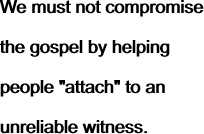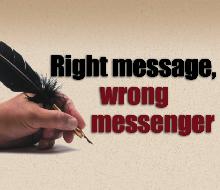 |
|
HOME | PROCLAMATION! MAGAZINE | DEVOTIONALS | STUDIES | LETTERS | ABOUT US | RELATED WEBSITES |
|
HOME / PROCLAMATION! MAGAZINE / 2008 / JANUARY/FEBRUARY / TINKER
JANUARY / FEBRUARY 2008
VOLUME 9, ISSUE 1
A R T I C L E S
Right message, wrong messenger
Can the messenger taint the truth?
Colleen Tinker
A few months ago we received a letter asking an important question. The question came from a ministry that supports several overseas missions, most of which operate in areas where there is significant Seventh-day Adventist presence: what did we think about a gospel presentation using Ellen White (EGW) quotations to teach Adventists how to be saved?
Realizing that many Adventists he encountered did not understand the biblical gospel, one of the mission directors had developed a method for presenting the gospel to Adventists using quotations from various EGW sources. By carefully selecting some of EGW's most gospel-sounding quotes, he was able to enlarge and elaborate on her words, explaining from his perspective what he thought she meant and why he thought she made those statements. The result was a presentation of the gospel using EGW as the "gospel teacher".
Old reactions
As I read the presentation the missionary had developed, I felt myself being pulled back into old reactions I hadn't experienced in over a decade. I had to force myself to stay focused, to follow the lines of reasoning from one EGW quote to the next.
Deliberately I evaluated the sentences and paragraphs. Indeed, the author of the paper was presenting the gospel. His choices of EGW quotes were careful. He used only the best, the most gospel-accurate statements from a variety of sources, yet I was not impacted by the power and mystery of Jesus' life, death, resurrection, and ascension. I was not compelled to worship and honor the Lord Jesus. Instead, I felt that old discouraging reaction to Ellen White's writings: a sense of familiarity with the cadence of her language; a deep sense of guilt and helplessness; a tendency to "zone out" and lose concentration.
Admittedly, my reaction does not reflect all Adventists' reactions to reading EGW. Some honor her and revere her writings; others rarely see her books and are not familiar with her works. Still others know her works but consider her to be peripheral: useful as commentary for emphasizing a point—a foundational icon that adds authority to one's argument. Some aren't sure what they think of her; they hold her writings in tension, dismissing her as a personal authority but retaining her as a prophetic voice that shaped their Adventist culture.
One thing, however, most Adventists hold in common, even if unconsciously: they experience her influence in their attachments to Adventist distinctive doctrines. Their deep commitment to the Sabbath, to their "state of the dead" doctrine, to their understanding of words such as grace, faith, and trust, to their perception of the "time of trouble" and the coming Sunday law—all these are rooted in Ellen White. Even those who do not know EGW's writings "know" her message. It is embedded within Adventist theology and culture.
As I read, I realized that it would be nearly impossible for an Adventist to learn the gospel from Ellen White's own words without also developing a deepening attachment to Ellen White herself. Because they already know she is credited with prophetic status, using her carefully chosen words to present the gospel would cement their trust in her. Adventists would have increasing faith in her works, and as they read more and more of them, they would trust even her non-gospel passages and fall into increasing confusion and bondage.
One source of truth
Learning the gospel from Ellen White would leave an Adventist with no clearer understanding of what to "do" than he already had. Adventists know that the church and Ellen White say the Sabbath will be the "final test" during the time of trouble; it will be the mark of their loyalty to Jesus.1 They believe that if they were to leave the Sabbath once they "understand" it, they would lose their salvation.2
For an Adventist to learn the gospel from Ellen White would prepare him to further accept the seventh-day Sabbath as his demonstration of loyalty to Christ. Such use of EGW would solidify her as a reliable source of truth and would anchor the Adventist securely to the "remnant church" and all its unique teachings which derive from EGW's writings, including the investigative judgment, the "health message", the "state of the dead", and Ellen White's writings as "a continuing and authoritative source of truth which provide for the church comfort, guidance, instruction, and correction".3
The Bible alone is the source of truth and is sufficient for equipping every person "for every good work" (2 Timothy 3:16-17). This same Bible warns us against teachers who add to the gospel:
Therefore do not let anyone judge you by what you eat or drink, or with regard to a religious festival, a New Moon celebration or a Sabbath day…Since you died with Christ to the basic principles of this world, why, as though you still belonged to it, do you submit to its rules: 'Do not handle! Do not taste! Do not touch!' These are all destined to perish with use, because they are based on human commands and teachings (Colossians 2:16, 20-21).
But even if we or an angel from heaven should preach a gospel other than the one we preached to you, let him be eternally condemned! As we have already said, so now I say again: If anybody is preaching to you a gospel other than what you accepted, let him be eternally condemned (Galatians 1:8-9)!
The Spirit clearly says that in later times some will abandon the faith and follow deceiving spirits and things taught by demons. Such teachings come through hypocritical liars, whose consciences have been seared as with a hot iron. They forbid people to marry and order them to abstain from certain foods, which God created to be received with thanksgiving by those who believe and who know the truth. For everything God created is good, and nothing is to be rejected if it is received with thanksgiving, because it is consecrated by the word of God and prayer" (1 Timothy 4:1-4).
Evaluate the messenger
Would a Christian missionary use the writings of Joseph Smith, Charles Taze Russell, or Mary Baker Eddy to teach the gospel to Mormons, Jehovah's Witnesses, or Christian Scientists?
Before using a human writer as the source of gospel teaching, one must first decide if that writer accurately teaches the gospel and represents the truth about the Lord Jesus in his or her works. If the writer does not teach biblical truth, that person must not be used as a reliable witness of the gospel.
When Paul and Silas were in Philippi, a "slave girl who had a spirit by which she predicted the future" met them. For several days she followed them around, shouting, "These men are servants of the Most High God, who are telling you the way to be saved" (Acts 16:16-17).
Finally, deeply troubled, Paul commanded the spirit to come out of the girl. Even though she was delivering the truth, she was the wrong messenger.
Similarly, Jesus met a demon-possessed man in the synagogue at Capernaum. When Jesus went in to preach, this man cried out at the top of his voice, "What do you want with us, Jesus of Nazareth? Have you come to destroy us? I know who you are—the Holy One of God!"
Sternly Jesus said, "Be quiet! Come out of him"(Luke 4:33-35)!
Truth delivered by a messenger who also preaches "another gospel" loses its purity. We must not compromise the gospel by helping people "attach" to an unreliable witness.
Truth will set you free
As I finished reading the study presenting the gospel through the writings of Ellen White I thought back to my own discovery of the new covenant gospel. For several years I had been reading the Bible without the help of Ellen White. In fact, I had been actively praying that God would teach me the truth of Scripture without an overlay of "EGW understanding". While more and more details were becoming clear, I still failed to understand that Jesus alone keeps the covenant with the Father and places me in Him when I believe in Him, thus covering me totally with Himself and His own personal righteousness.
Not until I came to the point of admitting to myself that Ellen White was a false prophet was I able to see clearly what the Bible taught about Jesus and the new covenant. Only when I released my right to respect Ellen White as a prophetic voice and a contributor to my spiritual worldview could I understand that in Jesus my salvation is complete. Jesus has fulfilled all that was written in "the Law of Moses, the Prophets, and the Psalms" (Luke 24:44). He is the reality for whom I had longed when my life had been shaped by His shadow (see Colossians 2:16-17).
I knew how to answer the question we had been asked. The gospel is clearly preached only when we use the Bible as our sole authority.
Jesus is the substance of all reality, and He is God's final Word to us (Hebrews 1:2).
"If you hold to my teaching, you are really my disciples. Then you will know the truth, and the truth will set you free" (John 8:31-32). †
Endnotes
- "The Sabbath will be the great test of loyalty, for it is the point of truth especially controverted." E. G. White, The Great Controversy, p. 605.
- "…We believe that being Seventh-day Adventists has a direct bearing on our salvation; that while a believer can be saved as a Catholic, I would risk my whole spiritual life and salvation were I to leave what I am now and join any other community." Jan Paulson, The Theological Landscape No. 4, "The Idea of Remnant" printed in the Adventist Review, (Review and Herald Publishing Association, Hagerstown, MD, 2002).
- Seventh-day Adventists Believe, an exposition of the fundamental beliefs of the Seventh-day Adventist Church, fundamental belief #18, Pacific Press Publishing Assoc, Boise ID, c 2005, p. 247.
![]()
Copyright 2008 Life Assurance Ministries, Inc., Glendale, Arizona, USA. All rights reserved. Revised September 24, 2008. Contact email: proclamation@gmail.com

